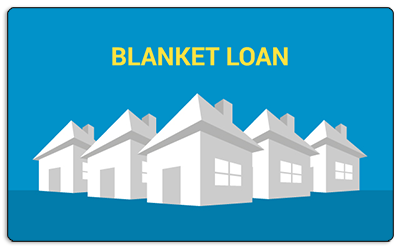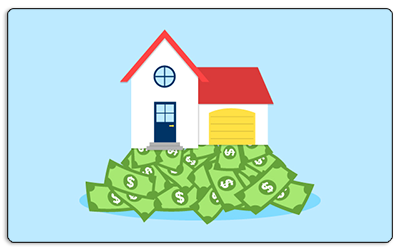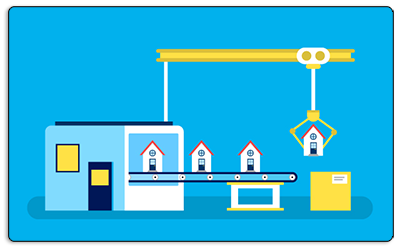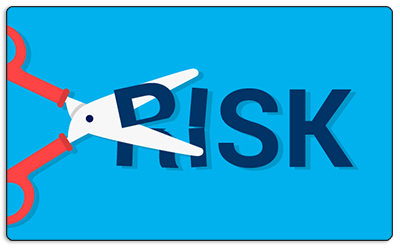Rental Home Financing Investment Loans
 The Short Term Rental Market is Growing & Here is Why:
The Short Term Rental Market is Growing & Here is Why:
Airbnb Investments Grow with a Single Blanket Loan
Investors are raking in cash during high-interest rates and the online platforms supporting short term rentals are growing exponentially. Regardless of rates, the short-term rental market is exploding because of a little-known secret to make investing easy.
If you're looking for a way to grow your Airbnb business with ease then a blanket loan may be the answer you're looking for. The market is exploding and we will tell you why, show you the proof, and show you how you can take advantage of it with ease.
What is a Blanket Loan for Airbnb Investments
BLANKET LOAN Definition:
A blanket loan is a single loan that can be used to finance multiple properties. This type of loan can be very helpful for investors who are looking to purchase multiple properties or grow their Airbnb business. Airbnb investments grow with a single blanket loan because you can keep adding properties to the same loan. To learn more about blanket loans, click here.
Introduction: What is a Blanket Loan and How Does it Work?
 A blanket loan is a type of real estate loan that covers all the debt on multiple properties under one loan. This type of loan is usually for commercial properties, but it can be used for residential properties as well. A blanket loan helps cover all the debt on a property, which can be helpful if the borrower has two or more loans on one property.
A blanket loan is a type of real estate loan that covers all the debt on multiple properties under one loan. This type of loan is usually for commercial properties, but it can be used for residential properties as well. A blanket loan helps cover all the debt on a property, which can be helpful if the borrower has two or more loans on one property.
A blanket loan is not a new type of financing and it has been around since the 1980s. They are popular because they are flexible and they allow borrowers to use different types of loans to finance their projects.
 Introduction: What are Blanket Loans?
Introduction: What are Blanket Loans?
Blanket loans are an alternative to traditional mortgage loans. A blanket loan is a type of personal loan that is secured by property you own. It provides the flexible option to pay back interest only or the entire balance in monthly installments placing all properties under one simple loan.
The advantage of having a blanket loan is that your profits can be used for things such as paying off credit card debt, buying a new car, investing in stocks and bonds, or even starting another business.
These loans are based on your property income and not your credit score which gives you the opportunity to take out more than what you would normally be approved for through banks or other lenders.
 Introduction: What is a Blanket Mortgage?
Introduction: What is a Blanket Mortgage?
A blanket mortgage is a type of financing that's used to buy an investment property.
Blanket mortgages are also known as "multi-purpose loans." They involve one loan for more than one property, usually using one asset (the home) as collateral, but with a loan from “Rental Home Financing” we consider the income the property brings in rather than your credit score.
The main difference between this type of mortgage and an individual loan is that you have fewer hassles trying to maintain multiple mortgages for your investment rental properties.
What is a Blanket Loan?
 For a real estate investor with multiple properties, a blanket mortgage covers all of them under one loan, it is a cost-effective and time-efficient way to reduce the stress of managing multiple loans. This is the "cliff-notes" version for learning about blanket loans. For those who are wanting to dig into details we wrote an extensive article on "All About Blanket Loans".
For a real estate investor with multiple properties, a blanket mortgage covers all of them under one loan, it is a cost-effective and time-efficient way to reduce the stress of managing multiple loans. This is the "cliff-notes" version for learning about blanket loans. For those who are wanting to dig into details we wrote an extensive article on "All About Blanket Loans".
Investment real estate rental mortgages can be complicated, each new mortgage creates more work. Without a blanket loan, the more you keep adding to your portfolio, you are adding new mortgages for each one; creating a nightmare of paperwork, payments, & accounting challenges.
Simplifying Investment Portfolios
With all the concerns of owning investment property for the real estate investor, like closing costs, the release clause, keeping up with multiple properties but under an individual properties loan, keeping up with all those pieces of real estate under a traditional mortgage with balloon payments and interest rates of a single mortgage for each of the rental properties; makes one wonder how real estate developers or property owner can keep up with any of the home loans at all.
With all the paperwork and multiple monthly payments to mortgage lenders, the home loans have drawn in house flippers instead of long time investors. Then people find out about types of loans called blanket mortgage loans. So let's learn more all about blanket loans.
All About Blanket Loans
A blanket mortgage solves the confusion of multiple loans by placing all properties under one loan with one monthly payment. This is completely simplifying the investment portfolio management process.
With a long-term loan, real estate may be sold without initiating a “sale case”, allowing you to use the proceeds of the sale to buy multiple properties. With Rental Home Financing, you can use a blanket loan for purchase or refinance. For example, if you buy a portfolio of a dozen rental properties, a blanket loan allows you to get a mortgage that covers all ten of them under one mortgage. Simple!
 Introduction: What is a Blanket Loan and What are the advantages of blanket financing?
Introduction: What is a Blanket Loan and What are the advantages of blanket financing?
This is a financial product that offers a wide range of features, including a line of credit. A line of credit can be used to help consolidate rental investment home debt and also for other purposes, such as investing in more property for your LLC.
Many Properties Under 1 Loan
This loan offers many benefits over other loans because it can be used in so many different ways. They are easier to get than most other loans and the interest rate is typically lower than on an unsecured loan.
 Blanket loans can be a crucial investment tool for property investors but finding blanket mortgage lenders can be challenging. They aren’t as proliferate as conventional mortgages and they might have more stringent qualifications.
Blanket loans can be a crucial investment tool for property investors but finding blanket mortgage lenders can be challenging. They aren’t as proliferate as conventional mortgages and they might have more stringent qualifications.
While it can be tough to find blanket mortgage lenders, there are property investment strategies you can take to make the process less time-consuming. Review this comprehensive guide to blanket mortgage lenders before you start your research.
 Investing in multiple properties is a practical investment strategy, but if you don’t have the cash, you might be wondering how you can take advantage of this financial tool. Blanket loans are one solution to purchasing multiple properties.
Investing in multiple properties is a practical investment strategy, but if you don’t have the cash, you might be wondering how you can take advantage of this financial tool. Blanket loans are one solution to purchasing multiple properties.
Finding solutions for this type of investment can be challenging. Blanket loan lenders can be hard to find, but there are ways you can improve your chances of finding the best financing offers. Review this guide to choosing the right blanket loan lender for your investment property.
 Investing in property is a practical strategy for generating passive monthly income. However, it can be hard to determine the best loan for investment property financing. There are a variety of loan options, terms, and restrictions that make it time-consuming to understand.
Investing in property is a practical strategy for generating passive monthly income. However, it can be hard to determine the best loan for investment property financing. There are a variety of loan options, terms, and restrictions that make it time-consuming to understand.
Fortunately, finding the best loan for investment property is made easier by reviewing the right information. With this comprehensive guide, you’ll be able to confidently apply for the right rental property loans and choose the one that makes the most sense for your investment goals.
 Investing in property requires a significant amount of capital — or easy access to credit — but sometimes you might need multiple loans to cover more robust properties. Blanket mortgages are one tool you can use to finance a property that has a higher value than one loan might cover.
Investing in property requires a significant amount of capital — or easy access to credit — but sometimes you might need multiple loans to cover more robust properties. Blanket mortgages are one tool you can use to finance a property that has a higher value than one loan might cover.
Blanket mortgages allow investors to purchase properties that might otherwise be unattainable, but they’re not for everyone. Before you decide to take this path, review this blog to find out if blanket loans are the right decision for your situation.
How to Know if You Need a Blanket Loan
Blanket mortgages sound like loans you take for that really expensive ReST bed you had your eye on. Even real estate professionals aren’t always aware they exist.
These multi-property loans are often confused with products like wraparound mortgages. But a wraparound mortgage is just a fancy second lien, whereas a blanket mortgage is a first lien.
Not only are blanket mortgages easier to deal with than those other complicated loans, but they’re typically offered only by specialized companies.
This is because traditional banks don’t have the capacity to train staff on how to help professionals who own multiple properties.
 It’s easy to start an LLC. Pick a name, choose a registered agent, and file articles of incorporation with your state. This step is always mentioned as a way to protect your investments. But an LLC is more than that.
It’s easy to start an LLC. Pick a name, choose a registered agent, and file articles of incorporation with your state. This step is always mentioned as a way to protect your investments. But an LLC is more than that.
Businesses are known for generating profits in an efficient manner. You don’t get to the size of a company like Walmart without a lean, mean operating machine. In fact, Walmart is a business you should be emulating with your own investment. Walmart is more than a retail giant - it’s a master at blanket loans.
 The internet makes it easier than ever to find lenders, check cashing, and other financial services. And we’re no longer stuck using the same handful of lenders our parents did. Today’s financial market is filled with reputable blanket loan lenders and other financial institutions that understand the challenges of a changing market.
The internet makes it easier than ever to find lenders, check cashing, and other financial services. And we’re no longer stuck using the same handful of lenders our parents did. Today’s financial market is filled with reputable blanket loan lenders and other financial institutions that understand the challenges of a changing market.
You can’t afford to wait five or ten years to get started with a portfolio of investment properties. Research shows rents are rising in major cities like Phoenix, AZ and Las Vegas, NV. Millennial homeownership in the gig economy is nearly 10 percentage points lower than in previous generations.
 You weighed the pros and cons of blanket loans carefully. It’s the right option for you, but you’re not sure who you can trust in the industry. Who can blame you?
You weighed the pros and cons of blanket loans carefully. It’s the right option for you, but you’re not sure who you can trust in the industry. Who can blame you?
Traditional mortgage lenders aren’t equipped to handle some of the more creative and advanced investment strategies. Your loan servicer is an expert in first-lien mortgages for single-family dwellings. The vast majority of loans she’s closing are government-backed FHA and VA loans.
Outliers she deals with are 2nd mortgages, reverse mortgages, and home equity lines of credit (HELOC). That’s about the extent of your current loan servicer’s knowledge, and beyond that, you’re stuck dealing with a commercial real estate agent.
How to Finance Multiple Rental Properties
 When it comes to rental property investment, growth is key to success on a large scale as a real estate investor. One of the chief concerns among investors new to real-estate is how to finance multiple rental properties. There are a variety of options available to you as an investor interested in more than one rental property.
When it comes to rental property investment, growth is key to success on a large scale as a real estate investor. One of the chief concerns among investors new to real-estate is how to finance multiple rental properties. There are a variety of options available to you as an investor interested in more than one rental property.
Why You Should Finance Multiple Rental Properties
There are plenty of reasons why you should be financing, not one, not nine, but over 10 rental properties at a time.
While you can make a tidy profit as an individual investor on a single rental property, the key to success is growth. Whether you’re on your own or part of a larger real-estate investment group, you can compound profits and drive growth by financing multiple properties.
What Is a Portfolio Mortgage?
 Portfolio mortgages are loans that are kept on the books instead of being sold. The significance of this to borrowers is that by not being sold on the secondary market, originating lenders can draft more flexible criteria for qualification. By relaxing qualification requirements, you can get access to money that would be denied to you elsewhere.
Portfolio mortgages are loans that are kept on the books instead of being sold. The significance of this to borrowers is that by not being sold on the secondary market, originating lenders can draft more flexible criteria for qualification. By relaxing qualification requirements, you can get access to money that would be denied to you elsewhere.
The Rundown on Portfolio Mortgages
Portfolio mortgages are held in the lender’s investment portfolio and are not sold on the secondary market. As such, they are not subject to the much more stringent terms that you’ll encounter with conventional lenders like banks. By not being held to the same standards, lenders that work with portfolio mortgages can make it easy for you to qualify.
 Duplex - 2 Unit Financing for Investors -
Duplex - 2 Unit Financing for Investors -
Stated Income Loans with No Tax Returns
Are you looking to expand your portfolio of real-estate holdings?
If so, you should work with a lender that specializes in portfolio mortgage financing.
Just as important, you should think long and hard about what kind of property you should add to your holdings.
For a number of reasons, it’s hard to think of a better option for most investors than a two-unit property.
 Successfully investing in rental properties requires more than just knowing which ones to pick.
Successfully investing in rental properties requires more than just knowing which ones to pick.
One of the most important aspects for long-term success is simply knowing how to find the financing you need to make your acquisitions. Rental Home Financing wants to be your lending partner!
If you’re focused on acquiring single-family homes, your best option is almost always going to be nontraditional lenders offering portfolio mortgage financing.
What Is Portfolio Mortgage Financing?
A portfolio mortgage lender, like Rental Home Financing, uses its own cash and often credit facilities to leverage money for the purpose of originating, underwriting, and closing several types of products related to the purchasing of residential properties.
 One of the most important aspects of success in real estate investing is understanding how to properly finance your portfolio.
One of the most important aspects of success in real estate investing is understanding how to properly finance your portfolio.
Countless investors skip this step, though.
They may eventually build what appears to be an impressive portfolio of a dozen or more properties, but because they didn’t finance it correctly, it hardly provides a full-time income.
So, while success requires mastering a number of different areas, creating a robust portfolio of rental properties will be much easier if you understand how to make the most of investor financing.
 Nothing can compare to a large portfolio of rental properties in terms of securing your financial future.
Nothing can compare to a large portfolio of rental properties in terms of securing your financial future.
The benefits of owning just a single rental property are significant. Owning multiple homes means greater cashflow, equity, opportunities for diversity, and, of course, a large payout if/when you decide to sell.
Of course, before you can enjoy all of these attractive benefits, you need to actually finance such a portfolio. For the first couple of properties, your local lender may be an option.
However, to build out the kind of portfolio that becomes your main – or even sole – source of income, you can’t do better than a blanket loan.
 Nothing quite compares to how it felt when you closed on your first rental property.
Nothing quite compares to how it felt when you closed on your first rental property.
It was a brand-new experience, maybe even one you weren’t sure you’d see all the way through.
But you did and, pretty soon, that investment began paying you back as rent checks coming in every month.
If you’re like most investors, it didn’t take you long to start thinking about going through the process all over again and purchasing another rental property. After that, it probably felt inevitable that you’d soon purchase one more.
At this point, you may be seriously considering turning real estate into the source of your full-time income. You might even be just one or two properties away from replacing your current salary. Then, why not just keep adding more to your portfolio?
This is usually when investors begin asking, “How many mortgages can you have?”
The answer may surprise you.
 If you’re an advanced real estate investor whose goal is to create a robust portfolio, it’s almost impossible that you haven’t heard of blanket mortgages before.
If you’re an advanced real estate investor whose goal is to create a robust portfolio, it’s almost impossible that you haven’t heard of blanket mortgages before.
They’ve become one of the most popular forms of funding for serious investors with growing portfolios. Still, that doesn’t mean they’re always the right choice for everyone.
So, before you take out a blanket loan, it’s worth taking a few minutes to consider both the pros and the cons associated with this type of unique mortgage.
 There are a number of benefits that go along with being a real estate investor, not the least of which is high returns delivered on a consistent basis.
There are a number of benefits that go along with being a real estate investor, not the least of which is high returns delivered on a consistent basis.
However, that’s not to say that investing in real estate isn’t without its challenges.
One of the most common with which investors struggle has to do with financing. Getting the best possible rates is obviously important, but so is picking the right type of loan. The wrong choice could turn an otherwise promising investment into one that falls short of its potential.
This is why the blanket mortgage has become such a popular choice among experienced investors.

Growing Your Investment Portfolio
How Many Mortgages Can I Have? At some point, every real estate investor ends up asking the same question, the answer may surprise you.
It usually comes after they’ve purchased three or four properties and are really beginning to see the potential for a much larger portfolio, provided they can find the financing for it.
At this point, they begin to wonder, “just how many mortgages can you have?”
Sound familiar?
If your real estate portfolio is coming along and you don’t want to stifle its growth, then finding out how many mortgages you can have is the natural next step.
 Investment Property No Ratio Loans
Investment Property No Ratio Loans
Building a portfolio of multiple rental properties is almost always a challenge – albeit a rewarding one.
To be successful, you must cultivate an eye for finding the best possible opportunities and then securing them at the lowest price. Of course, that’s just the beginning. After purchasing a property, you then need to go through the process of renting it out and managing the investment year after year.
Nonetheless, for many investors, the biggest challenge remains securing a loan to begin with. Unfortunately, the more properties you add to your portfolio, the harder this tends to be. Many investors have to pass up otherwise amazing opportunities because their current portfolio would make it impossible to add another home.
The good news is that there is a solution: No-Ratio Loans for Investment Properties.
 Are you an experienced real estate investor who wants to grow their portfolio by more than just a single property? Everything you need to know about a blanket loan is right here. You should know about one of the best lending solutions for that kind of venture.
Are you an experienced real estate investor who wants to grow their portfolio by more than just a single property? Everything you need to know about a blanket loan is right here. You should know about one of the best lending solutions for that kind of venture.
You came to the right place to increase your investment portfolio.
What Is a Blanket Loan?
When most people think about taking out a loan to purchase a property, they imagine a residential or commercial mortgage. This has been the standard for decades. Now things are different, we can provide a loan for many properties under one loan.
Yet, while this has become the most popular version for buying a property, investors often want to buy more than one at the same time. In these situations, an experienced investor will almost always opt for a blanket loan.
 Many Properties Under 1 Loan
Many Properties Under 1 Loan
With a blanket loan, you can secure numerous properties at once without the same inconvenience and overhead associated with multiple mortgages. Blanket loans offer a number of other unique advantages, as well.
These business-purpose loans can include:
However, they can be used to purchase many, many more. Why not try our quick form and get started today!
Cross-Collateralization Across Investment Properties – and State Lines
Another reason an experienced investor will usually choose a blanket loan is that it allows them to cross-collateralize properties – even across state lines. So, not only is the investor able to finance several properties through one lender, they can also use this arrangement to finance other deals. Look into our Foreign National Investor Financing Program.
 A Blanket Loan Can Free Trapped Equity in Your Portfolio Loan
A Blanket Loan Can Free Trapped Equity in Your Portfolio Loan
Not so long ago, developers and investors alike depended on leveraging the equity they had in properties to finance further ventures. Unfortunately, this means the investor’s equity has essentially become “trapped” within the property.
A Blanket Loan Can Leverage the Support of an LLC. While the investor’s personal financial history may play a role, as well, it’s usually very helpful to have the backing of an LLC during the consideration phase. This can lead to a much larger blanket loan than they would have otherwise received.
The Release Clause & Closing Costs
The last trait of a blanket loan that we need to talk about is the release clause. This is an essential feature because, without it, these loans would lose a crucial degree of flexibility.
In short, the release clause of a blanket mortgage gives the investor the right to sell off individual properties it covers without selling all of them. Having a way for extra money to throw at closing costs is quite an advantage. Call us today – 1-888-375-7977and speak with one of our qualified representatives
7 Advantages of a Blanket Financing Loans for Term Rentals
Aside from the traits described above, there are a number of other reasons so many investors choose to use a blanket loan for their deals. Individually, most options don’t offer these advantages. However, only a blanket loan offers all of them. Check out our top seven advantages for a blanket loan below.
 1. There Is No Limit to the Number of Properties You Can Own
1. There Is No Limit to the Number of Properties You Can Own
Fannie Mae and Freddie Mac can only offer so much help. Both FNMA and FHMC limit the number of properties they finance to just 10. Once you hit that limit, you’re on your own when it comes to financing. That’s not ideal.
Fortunately, there is absolutely no limit to the number of properties you can pay for using a blanket loan. There is also no limit to the number of properties you can own in order to be eligible to apply for one.
2. Consolidating Your Properties into One Type of Loan
Of course, that’s not the only reason a blanket loan works so well for investors with multiple properties. Even if it wasn’t one of the only sound options available, it would still be one of the most attractive simply because you can consolidate all of the properties you own under a single loan.
You could even use the additional properties to negotiate more favorable terms with a lender. Want to consolidate your properties?APPLY ONLINE NOW
3. Rental Property Financing Streamlined Accounting with Just One Small Business LLC or Business Partnership
If you think taking out multiple loans is going to be inconvenient, wait until you need to maintain the related bookkeeping year after year. Quite the nightmare with many properties. The alternative is 5 or 6 blanket loans with each one covering 10 mortgages. That is much more manageable.
 4. Leverage the Equity from Many Properties or Partner Buyouts
4. Leverage the Equity from Many Properties or Partner Buyouts
The next time you find a great property to invest in, you can pool the equity from your existing properties, cash it out, and use it as a down payment toward the purchase of this new rental home – or rental homes. Got a partner buyout planned? APPLY ONLINE NOW!
5. Greater Borrowing Power with No Debt to Income Ratio
You’ll be able to prove you’ve already been responsible with a large sum. That means you shouldn’t have much trouble securing even more.
This is a huge advantage far too many investors miss out on when they utilize individual loans for their properties.
6. Take Advantage of Your Strong Cash Flows with your Mortgage Loan
When a lender considers you for a blanket loan, they’ll conduct a global cash flow analysis on each of your properties using a Debt-Service Coverage Ratio (DSCR) assessment.
All of this works to your advantage when you bundle properties because those with stronger cash flow will help make up for those that are weaker.
 7. Reduced Risk & a Low Interest Rate than Traditional Mortgage from local banks with a Single Mortgage
7. Reduced Risk & a Low Interest Rate than Traditional Mortgage from local banks with a Single Mortgage
Although purchasing multiple properties may seem like it does the opposite, recall that a blanket loan involves the benefits of an LLC. Just one of these many benefits is that the LLC protects the investor against liability issues. These issues could otherwise put the investor’s personal finances at risk. Instead, the LLC would take the brunt of any legal recourse.
Reduce your investment risk, APPLY ONLINE NO or Call us today – 1-888-375-7977
Rental Home Financing
Your Residential Blanket Mortgage Lender for money loans!
Our residential blanket mortgage loans are specifically designed for income property owners and investors on a Nationwide basis. Borrowers, brokers, and hard money lenders now have access to an unlimited fund, backed by experienced professionals, that has attractive financing options with no seasoning and reasonable underwriting guidelines.

Forecasted Rental Property Growth Rates
Why the single-family home rental market is trending up, up, up
Single-family-home rentals are on the rise and all signs point to continued growth and opportunities for investors to cash in on the trend. Millennials opting to rent vs. buy are creating a demand for rental homes across the nation and expanding a market that has seen steady growth in recent years.
Why the huge demand for rental homes?
One reason could be a lack of inventory. According to Time MONEY, single-family home construction still hasn’t recovered from cutbacks, following the financial crisis. Potential buyers are finding housing shortages in cities like Nashville, Raleigh and Kansas City, where low inventory hasn’t historically been an issue.
Stricter credit requirements have also come into play. The loose lending practices during the last housing boom left nearly 8 million homeowners in foreclosure. What resulted was a financial reform law with new, firmer rules for lending.
Single Family Rental Homes (SFR) Vs. Multifamily Rental Property Investing
What is better; single-family home investing or multifamily apartments?
There are passionate advocates for both of these types of rental property investments. How do they really stack up? Which is the smarter move?
There are some investors who are very bullish about multifamily apartment buildings and argue that they have traditionally offered some advantages in the real estate investment space.
Let’s look at both the pros and cons of these sections of the real estate investment market.

Rental property growth rate data shows it may be a great time to both restructure and ramp up investment portfolios. Here are the stats, quirks, and opportunities rental property investors should be watching now…
The Rental Property Market Correction
Rental rates began slowing in 2016 according to CoreLogic. They experienced a massive surge in the wake of 2008, and marched upward at an amazing pace for several years back to back. Then credit slowly began to become more accessible to home buyers, while new multifamily construction took off. That construction and completions is believed to have peaked in 2017. Some softness may be patched up by tight inventory, a stronger national economy, and the absorption of new apartment units. Analysts believe that overall, the US should see continued modest gains in rental property growth rates, though trends will be localized.
 The Equifax Hack for Property Investors
The Equifax Hack for Property Investors
What does the huge Equifax credit hack mean for rental property investors?
The supersized hack of credit bureau data could have a substantial impact on real estate, the economy, millions of individuals, and rental property investing. Here’s what rental home investors need to know…
The Equifax Hack & Credit Quality
With the massive data breach at Equifax potentially impacting close to 300M Americans, plus Canadians and the British, there are likely to be many renters and would be home buyers affected over the months and years to come. Some of those who hoped to buy homes will no longer qualify for traditional home loans.
The renter pool could see a significant dip in average credit quality due to ID theft and fake accounts being taken out in consumers’ names. Rental property investors should be anticipating this. If the damage really begins to stack up, landlords may have to lower their approval criteria, and dig deeper into credit. Check if this is an applicant who has maintained good credit until recently, and maybe a real hacking victim. In which case their rent-to-income ratios may also be far better in reality than their reports show
More...

Housing inventory shortages have been a hot issue over the last 18 months. Where is this crisis at its worst? What opportunities does it present for investors?
Realtors have been continually stressed about the shortage of housing inventory over the last couple of years. This may bring both advantages and disadvantages for some real estate investors. So, just how tight is the market? What is causing the drought in supply? Where are the opportunities?
Supply & Demand: America’s Tightest Housing Markets
The days of America being a massive buffet of homes capable of filling the appetite of every individual and global fund have certainly changed a little in the last ten years, according to the media. In January 2017, economist Jonathan Smoke said two thirds of the US housing market is seeing less inventory, with tight credit and limited construction remaining factors in this change.

How can income property investors protect their portfolios from hurricane risks?
Natural disasters and hurricanes in particular appear to be imposing increasing threats to real estate investors. Storm seasons appear to be more active, wildfires have grown worse, and direct hits to residential areas feel like they are larger and more expensive than ever. What can rental home and multifamily property investors do to be better prepared to weather these conditions, and bounce back quickly?
The Risks
Natural disasters like hurricanes bring a multitude of broad and long risks for income property investors.

Just how bad is the impact of Hurricane Harvey on the Houston housing market? What will it mean for real estate investors? What does the potential for recovery look like?
Harvey’s Impact on Houston
At least tens of thousands of Houston housing units have been impacted by Harvey. Some estimates put this damage at around $400B. That’s around 4x the cost of Katrina. Add to this the loss and damage to other commercial properties, and interruption of business, and the impact over the next few years could come close to $1T.

Where are the best places to invest in rental homes now?
Home prices are up and rental yields have been squeezed in some areas. So, where are the best markets for rental property investors to acquire new income producing assets now?
The Hunt for Yield
According to The Street, these are 10 of the best markets for rental property yields in 2017:
![]()
Cash flow real estate continues to grow in popularity with individual and Wall Street level investors alike. What’s the big draw to, and what advantages of this asset class?
There are many reasons cash flow properties are an attractive investment. Here are seven of those drivers to consider when looking for new investments.
Key Highlight Overview Points
- Cash Flow
- Equity Growth
- Returns
- Security
- Leverage
- Let Others Pay Your Investments
- Learn About Tax Benefits

DSCR LOANS
No ratio DSCR and DSCR based loans offer different advantages to investors, depending on their status and the type of property they are acquiring.
DSCR stands for Debt Service Coverage Ratio, which is a fancy way of saying, "is there enough cash flow from the monthly rent to cover the mortgage payment, insurance, and taxes?"
What is a DSCR Loan?
When you use a DSCR loan product, you are choosing a loan driven by the ratio of the monthly rent to the mortgage payment, taxes, and insurance. This ratio will drive the size of the loan and the pricing.
What is a No DSCR Loan?
With a No DSCR loan, the same ratio used in a DSCR loan is considered, but it's not the primary consideration for the lender when it comes to the size of the loan and the price. These are asset-based loans, based on the value of the property.
For example, with a No DSCR loan, you will get up to 70% of the value based on the appraisal with a rate falling within the lender's range. Pricing incentives may be given for good credit scores, loan-to-value, zip code, loan size, term and leased vs vacant.
![]()
Real estate investors often run into issues with financing properties once they hit about 10. Having more than 10 mortgages isn't allowed by many lenders. Some won’t loan to borrowers who have as few as 4 mortgage loans on their credit. So, how are you supposed to build your empire to 20, 30 or even 100 properties?
There are a few ways you can find the financing you need, when you have more than 10 rental properties. Since most lenders will stop loaning you money after you have 4 to 10 mortgages showing up on your credit report, you need to know where to turn, in advance. Here are a few ways to finance more than 10 properties as an investor.
A blanket mortgage allows you to finance an entire portfolio of rental properties, without limits. Builders and developers often use these types of loans along with commercial property investors. When you need to fund more than one property, you can use a blanket loan, which will act as one loan with a single servicer. This not only helps you to finance more than ten properties, but also helps to cut down on the paperwork of managing payments each month.
![]()
Stated income loans could provide the liquidity and confidence needed to fuel an extended surge in the US property market.
Home sales are up, the economy is looking up, and demand for real estate is growing. However, it could be stated income loans which finally offer the fuel needed to get investors more active, and provide the new round of growth analysts have been watching for.
US Investment Trends
New data from the National Association of Home Builders shows US home builder confidence hitting yet another new high in March 2017. It is now at its highest level since June 2005. CBRE’s new Global Investor Survey also shows $1.7T in capital is waiting to be deployed into property markets this year, with North America being the preferred destination. This could be compounded further with Eric Trump’s recent revelation that his organization is planning to halt developing projects overseas, in favor of more domestic investment.

There are a lot of investment options out there. Why are savvy and experienced investors still trending towards investing in single family homes? What are the benefits?
1. Passive Income
The need for passive income far outweighs simple returns or potential for asset growth. Single family homes are true workhorses for churning out cash flow and passive income month after month. With good property management investor-landlords can put their portfolios on autopilot and just let the returns flow in.
![]()
New No Ratio Loans offer real estate investors simplified financing options for taking advantage of the current market, fast.
This is expected to be another record year for the US real estate market. In order to take full advantage of the opportunities, investors need leverage. Interest rates may have changed, but many investors have been holding back due to fears of the hassles of applying for financing. Fortunately, a variety of new lending products are available in 2022, including streamlined loans with limited documentation requirements.
Rental Home Financing
9465 Counselors Way
Suite #200,
Indianapolis, IN 46240
About Rental Home Financing:
Rental Home Financing, as the best mortgage lenders we originate rental home loan products and cash out refinance investment property loans as the best investment property refinance lenders. Commercial blanket loans are available with a commercial purpose to suit your needs.
Also, as DSCR loan specialists, we are currently authorized to make such loans in most all areas of the United States. Specific circumstances will determine whether we have the ability approve/close portfolio rental home loans in your state(s). When you are ready to get a mortgage for rental property, we are ready to serve you.



 Introduction: What are Blanket Loans?
Introduction: What are Blanket Loans?







